On Jan. 21, 2018, Alex Honnold attended the Women’s March in Las Vegas along with thousands of others rallying in support of women’s rights and other issues. Dressed demurely in black sweats and holding a hand-drawn cardboard sign that read, “Women’s rights are human rights,” Alex blended in with the estimated 20,000 supporters as he marched into Sam Boyd Stadium. Afterward, he shared photos from the event on Instagram, a seemingly innocent and nearly requisite action in modern social media culture. The post generated more than 56,000 likes (because Alex just happens to be the most famous rock climber in the world), along with immediate criticism from fans. One in particular stands out, not because of its political opposition, but in the commentary about Alex’s role as a professional climber, “Alex, I follow you for your climbing stoke and prowess, not your politics. Stick to what you’re great at and don’t confuse things or I’m cutting you loose.”
And Alex doesn’t disagree, “I’m not an activist. I’m a rock climber.” Regardless of intention, the impact of Alex’s stance is just as powerful as an athlete heavily focused on activism. “It’s not about having the platform, it’s about doing the right thing. You should care about being a decent human being,” he said. Practical advice from the man who pursues just about the most impractical type of rock climbing imaginable. He adds, “Sometimes standing up for your convictions can be harder than overcoming physical fear.”
Although Alex doesn’t see himself as an activist, there’s no denying many professional outdoor athletes today feel emboldened to speak their minds and have an increasingly large platform to do so. After all, elite climbers like Fred Beckey lived in relative autonomy, at least to the masses in the decades preceding Alex. The modern professional athlete benefits from a rapidly expanding outdoor industry, and greater public interest and media coverage. Beyond this, outdoor athletes are leading the charge in a shift toward more job autonomy from previous generations of pros and are often celebrated by fans and sponsors alike in and out of their sport of expertise.
Athletes have been using their media presence as a platform of protest or to share their political views for decades, but not always to a receptive audience or sponsors. In 1967 Muhammad Ali famously protested the Vietnam War by refusing to enlist in the military; his championship title was stripped as a result. The following year during the summer games in Mexico City, track athletes Tommie Smith and John Carlos both raised their fists and bowed their heads in a “Black Power salute” protesting black poverty and lynchings. More recently, Colin Kaepernick’s decision to kneel during the national anthem to call attention to police brutality and racial inequality inspired other professional athletes to follow suit.
In the outdoor industry, activism among athletes, specifically tied to the environment, is nothing new. Yvon Chouinard, a climber turned founder of Patagonia, has vocalized and connected sport, business and sustainability for decades. Increasingly, major outdoor brands are speaking up about political and environmental issues. They’re also involved with lobbying, protests and even lawsuits involving environmental, public lands and human rights issues. With this shift, it also naturally opens the gateways and can encourage athletes to expand their public identities beyond climbing, running or skiing toward the larger issues and causes they care about.
So, what exactly is the job description of a professional athlete today? I talked with three notable outdoor athletes to get their perspective.
Alex Honnold: The Climber
Alex does not necessarily think the role of a professional athlete involves politics and activism. Instead, the laser focus he uses when freesoloing some of the most daunting climbs in the world is also apparent in his self-professed career objective—to climb. Of course that doesn’t mean he doesn’t balance this with other things in his life. “I’m just like the orthodontist down the street. I have a larger platform than most, but I’m using social media the same way any thoughtful human being should.”
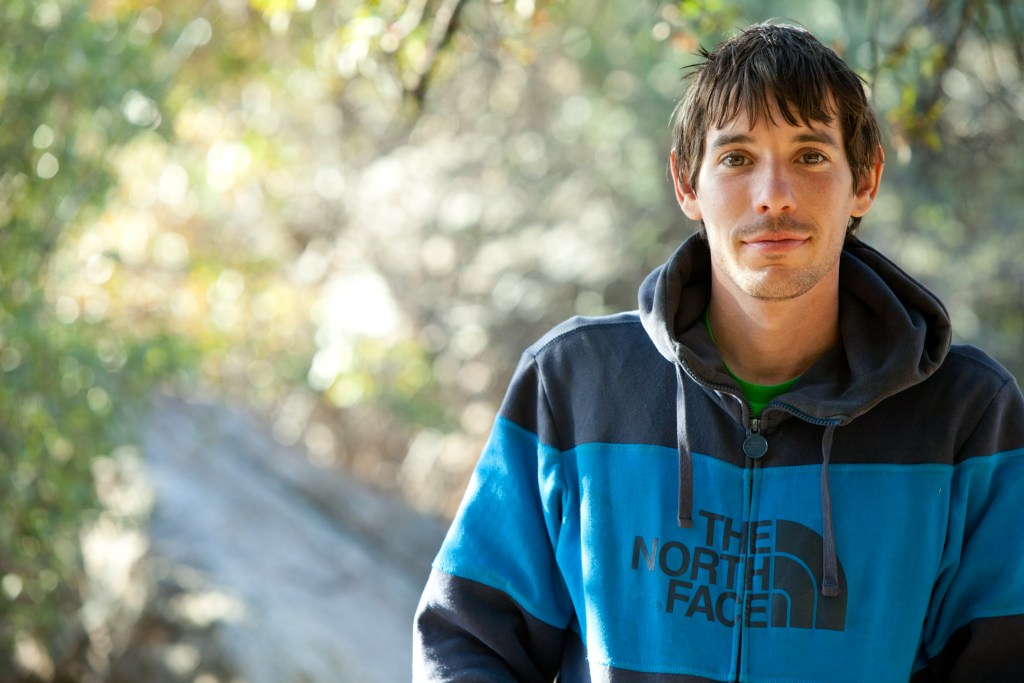
Photo Credit: Andrew Burr
In fact, his attendance at the Women’s March fell conveniently on his “rest day” (akin to a typical career person’s day off). “I’m a rock climber, so being an athlete, climbing and training come first. I think about this a lot with my foundation and the other things I invest my time in outside of climbing,” he said. “My girlfriend felt strongly about [attending the Women’s March] and it was something I wanted to be a part of. [The Las Vegas march] was 15 minutes from my house, which is more realistic than flying to the official one in Washington, D.C.”
Perhaps his outlook highlights more than anything else why we often look up to professional athletes. After all, when we realize that the people who push the boundaries of human performance are, at their core, the same as everyone else, we can begin to see that spark of greatness in ourselves and our community. Athletes like Alex, whether on the wall or off, impact us in such a way that we no longer can simply sit on the couch in admiration.
Caroline Gleich: The Groundbreaker
Ski mountaineer Caroline Gleich pushes herself to train and ski the toughest lines in the world, while also traveling to Washington, D.C., to lobby for climate change and public lands issues. She considers her activism a job responsibility, whether sharing via social media the latest way to contact government officials about an issue or attending a local protest in her hometown of Salt Lake City. Caroline strategically uses her platform of 145,000 Instagram followers to help effect change in politics and the environment on an equal scale with her athletic pursuits. “My parents instilled in me a sense of helping and serving others, especially with my job,” she said.
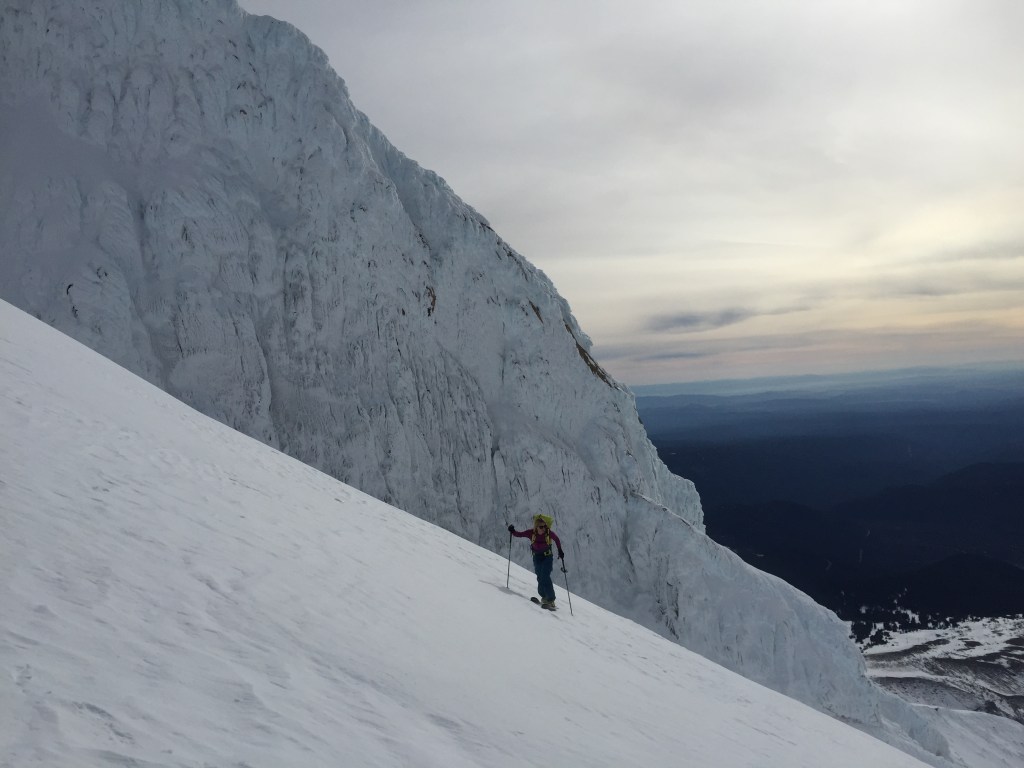
Caroline climbs up Mount Hood. (Photo Credit: Rob Lea)
In fact, she describes her fusion of athletics and activism as “seamless” and that it helped to serve as an entry point to the brands she partnered with at the beginning of her pro career. From day one Caroline says she didn’t receive pushback about her multifaceted goals as an athlete, but she also refused to compromise her beliefs and voice as an athlete in exchange for sponsorship dollars. Perhaps this is one of her most groundbreaking moves of all—as brands open up the floor space for more authentic and autonomous athletes, so too do athletes have the opportunity to maximize the companies they align with. (Caroline’s sponsors include Patagonia, REI, Julbo, Leki, Clif Bar, Pret Helmets, Movement Skis and KEEN.)
Although she remains humble at the notion of inspiring other athletes to step up in the political arena, she is certainly at the forefront of the industry shift. Her involvements span global, national and local initiatives, and range from sport-driven pursuits to presenting at cut-and-dried political meetings. A clean-air activist for more than a decade, in February Caroline recently ran 25 miles with 10,800 feet of vertical gain up Grandeur Peak in the Wasatch Range, as part of Salt Lake City’s Running Up For Air to help raise money to improve the region’s air quality. She met with B Corporation leaders in Taos, New Mexico, to brainstorm ways business can make the world a better place. In early March, she traded ski bibs for a business suit and flew to Washington, D.C., to do political advocacy work with The Conservation Alliance and to communicate with senators and representatives from Utah, Idaho, Montana and Colorado about protecting public lands. She also recently joined the Wasatch Backcountry Alliance board of directors to help preserve the range for future generations. Oh, and she also took a knee—while her focus as an outdoor athlete is on an environmental arena, Caroline is certainly connected to the causes of athletes in other playing fields.
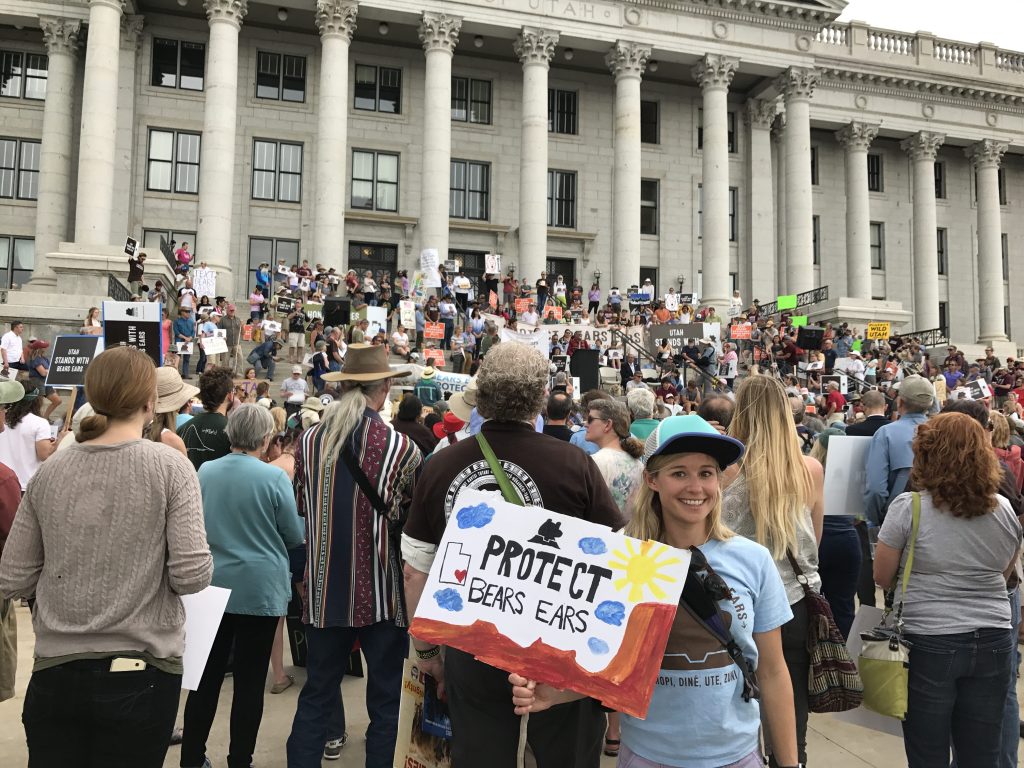
Caroline at the first of several national monument rallies in Utah. (Photo Credit: Iris Noack)
With a schedule packed tightly with meaningful commitments, it seems doubtful that anyone except a professional athlete could keep up that sort of pace and intensity. Caroline finds inspiration in her skiing and climbing community, which includes her boyfriend, Rob Lea, and friends like Brody Leven and Len Necefer, who are just as likely to get out into the mountains with her as attend a political rally. She knows the impact of her actions are stronger in greater numbers.
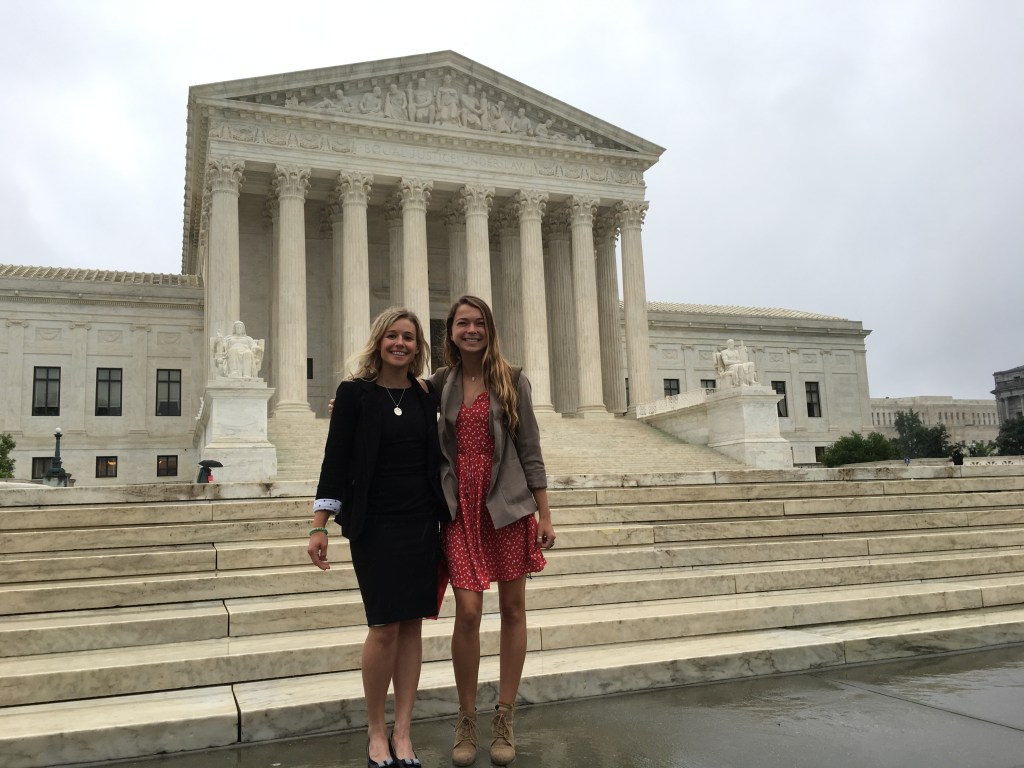
Caroline Gleich with outdoor advocate and writer Katie Boué in Washington, D.C. (Photo Courtesy: Caroline Gleich)
Clare Gallagher: The Fresh Face Of Pro Athletics
Although trail-runner Clare Gallagher is somewhat of a newcomer in the world of professional sports, she already has major career wins under her belt and understands her career responsibilities with an accelerated maturity. “As soon as my running started taking over as my full-time gig, I started to hybridize the two. Trail running and environmental activism, especially public lands and climate change, are synonymous in many cases to me,” she said. With athletes like Caroline paving the way for a melting pot of athletics and activism, the new guard of pro athletes is stepping up to the plate without hesitation to use its collective fame and skill sets to make a difference beyond sport. Clare speaks fondly of Caroline’s influence on her pro career, “Caroline isn’t afraid to say what a lot of people are thinking and know is right, but still don’t say it. She has gusto and is a mixture of this insanely incredible mountain skier and endurance athlete with a brain equally as mind-blowing. I’m inspired by her daily and motivated to be as well-read and vocal about things that matter as Caroline is.”
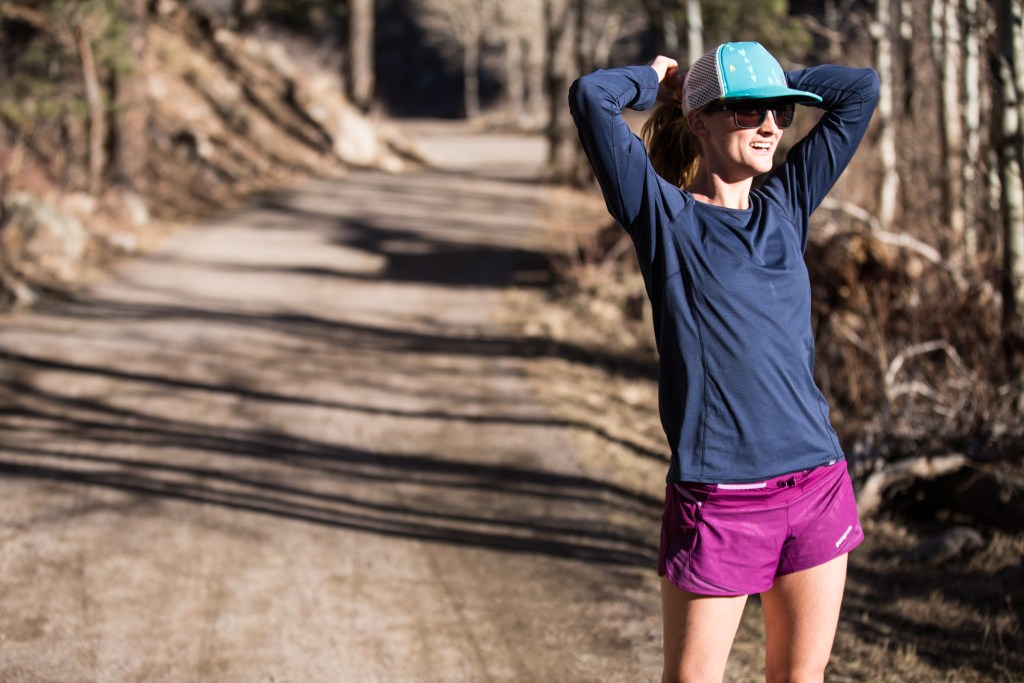
Photo Credit: Mike Thurk
Clare feels her role as a Patagonia athlete ambassador is multifaceted. She works closely with the marketing team—“I’m paid to run in Patagonia clothes,” she says, competes at the highest level in trail races and uses her platform to talk about relevant issues. When she isn’t training, Clare makes time to speak about the causes she believes in. She recently gave a presentation with the nonprofit Protect Our Winters to hundreds of students at Cherry Creek High School in Denver, her alma mater, about the importance of climate policy. She also engages with local senators and representatives.
Clare also extends this philosophy to her race selection. Her recent win came at the Cinque Terre Ultra Trail 50K in Italy, a race aimed at bringing awareness and improving park service transparency to the Cinque Terre region’s trail system. “They need to step up their game in maintaining trails and educating tourists on the value of the trails and how to explore them,” Clare said. Rather than focus her energy solely on the competition, Clare attended numerous community events throughout her stay in Italy and shared Instagram stories encouraging travelers to contemplate where and how they spend their money on their next vacation.

Photo Credit: Mike Thurk
Although Clare’s political interests focus primarily on climate change and public lands, she also encourages consumers to shop their values. “My job as an athlete (representing brands like Patagonia) is to urge you, the consumer, to ask questions and make a statement with what you buy,” she said. Professional athletes no doubt wield a powerful consumer influence for endorsements, and athletes like Clare are increasingly partnering with brands that align with their personal principles and buying standards.
Whether it’s Alex’s desire to be a climber first yet be free to share his thoughts on social media, Caroline’s taking on activism along with a packed ski season, or Clare’s desire to inspire the consumers of the brands she works with, we are witnessing athletes making noise. Athletes making waves. And Athletes determining their own job descriptions.
